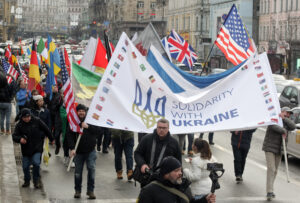July 2013, Volume 24, Issue 3
Election Watch
Reports on elections in Bhutan, Bulgaria, Equatorial Guinea, Kenya, Malaysia, Montenegro, Pakistan, Paraguay, Philippines, and Venezuela.
816 Results
July 2013, Volume 24, Issue 3
Reports on elections in Bhutan, Bulgaria, Equatorial Guinea, Kenya, Malaysia, Montenegro, Pakistan, Paraguay, Philippines, and Venezuela.
January 2019, Volume 30, Issue 1
Reports on elections in Afghanistan, Armenia, Bahrain, Bhutan, Bosnia-Herzegovina, Brazil, Cameroon, Democratic Republic of Congo, Fiji, Gabon, Georgia, Latvia, Madagascar, Maldives, São Tomé and Príncipe, Swaziland, and Togo.
January 2002, Volume 13, Issue 1
The United Nations did superb work in helping Mozambique to end its long-festering civil war and start down the path to recovery, but those gains could slip away amid ominous conditions of partisan polarization, excessive political centralization, and a winner-takes-everything electoral system.


January 2022, Volume 33, Issue 1
Whether democracy regains its footing will depend on how democratic leaders and citizens respond to emboldened authoritarians and the fissures within their own societies.
January 2017, Volume 28, Issue 1
Reports on elections in Belarus, Bulgaria, Cape Verde, Cote d'Ivoire, The Gambia, Ghana, Georgia, Haiti, Kuwait, Jordan, Lithuania, Montenegro, Morocco, Nicaragua, Palau, Russia, Uzbekistan.
January 2019, Volume 30, Issue 1
Excerpts from: the G7 Charlevoix Commitment on Defending Democracy from Foreign Threats; victory speech by Brazilian president Jair Bolsonaro; inaugural address by Mexican president Andrés Manuel López Obrador; inaugural address by Maldivian president Ibrahim Mohamed Solih; remarks by Angolan journalist Rafael Marques; and address by former U.S. Secretary of State Madeleine Albright commemorating the 100th anniversary of the Washington Declaration.
April 2024, Volume 35, Issue 2
The battle over rights for sexual minorities has divided countries into opposing camps. But autocrats are lashing out with one aim: countering the liberal international order.
April 2022, Volume 33, Issue 2
Excerpts from: letter from the Editors of Novaya Gazeta; Speech by Ukraine’s UN Ambassador, Sergiy Kyslytsya; statement by former Lithuanian president Dalia Grybauskaitė; statement by the Russian Anti-War Committee; transcript of an interrogation of an antiwar protester by Russian police; speech by Ukrainian president Volodymr Zelensky to the U.K. Parliament
Just a month after its introduction, ChatGPT, the generative artificial intelligence (AI) chatbot, hit 100-million monthly users, making it the fastest-growing application in history. For context, it took the video-streaming service Netflix, now a household name, three-and-a-half years to reach one-million monthly users. But unlike Netflix, the meteoric rise of ChatGPT and its potential for…


October 2023, Volume 34, Issue 4
Generative AI can flood the media, internet, and even personal correspondence with misinformation—sowing confusion for voters and government officials alike. If we fail to act, mounting mistrust will polarize our societies and tear at our institutions.
October 2023, Volume 34, Issue 4
A final statement by Russian activist and opposition politician Alexei Navalny; The North Atlantic Council’s communiqué on Ukraine; Legal analyst Ethan Hee-Seok’s testimony on North Korean asylum-seekers at the China–North Korea border; “Voices of a New Belarus” by playwright Andrei Kureichik; Guatemalan president-elect Bernardo Arévalo’s victory speech.

July 2023, Volume 34, Issue 3
Behind today’s authoritarian wave are democratically elected leaders who use and abuse institutions to undermine the system that brought them to power. But with the right strategies, opposition forces can slow or stop these would-be autocrats.
January 2015, Volume 26, Issue 1
A survey of the region yields a patchwork result, with democratic governance faring well in some countries, at a standstill in others, and in the most worrisome cases actively eroding.
July 2007, Volume 18, Issue 3
By world standards, Latin Americans ideologically are slightly to the right. But their attitudes are moving leftward, a trend with potential implications for democratic stability in the region.
July 2004, Volume 15, Issue 3
Since the end of the Cold War, Central America has seen a regionwide diminution of military influence that bodes well for democratic governance and healthier civil-military relations.

Forget his excuses. Russia’s autocrat doesn’t worry about NATO. What terrifies him is the prospect of a flourishing Ukrainian democracy.
October 2012, Volume 23, Issue 4
A review of The Dictator’s Learning Curve: Inside the Global Battle for Democracy by William J. Dobson